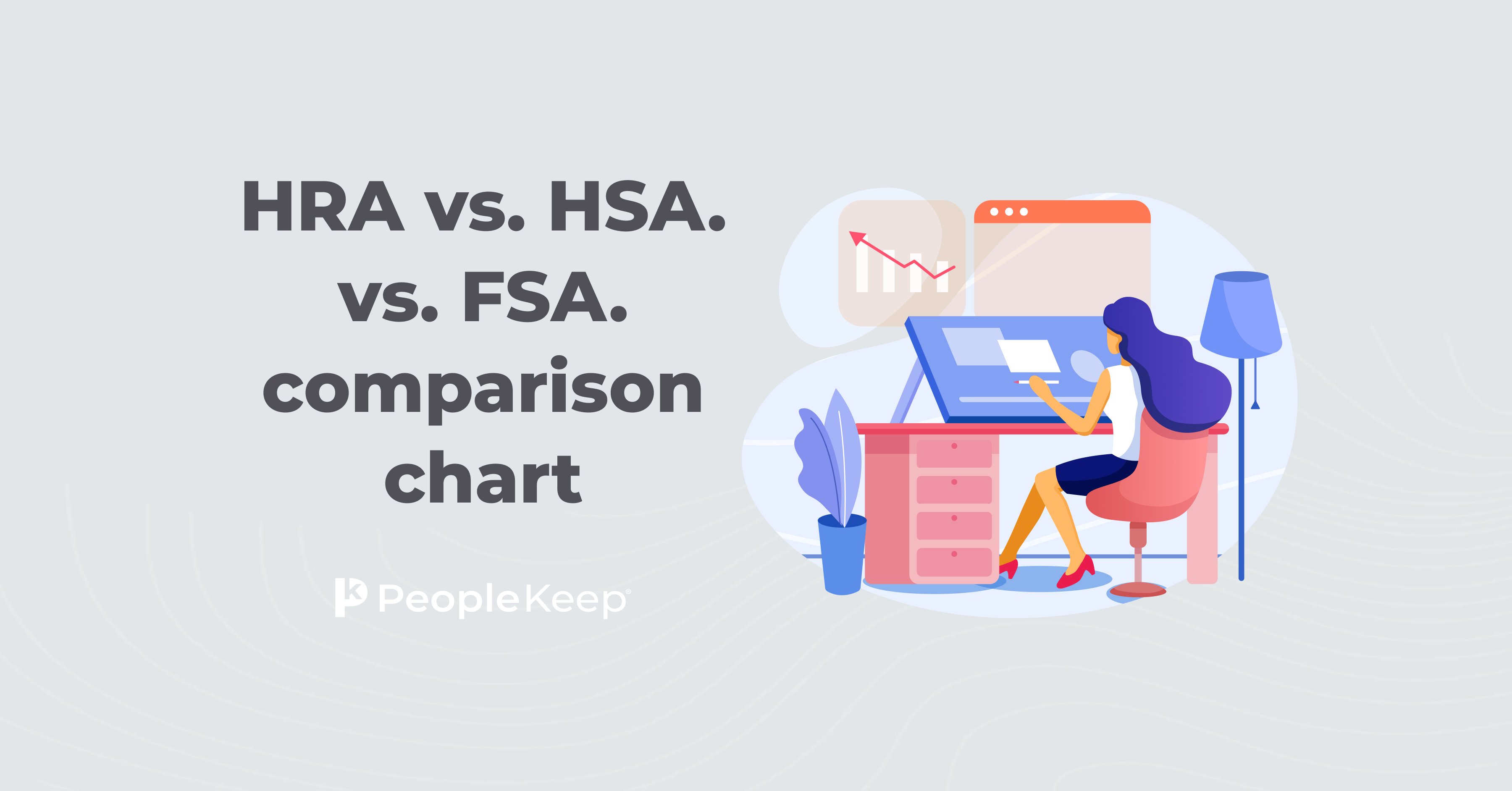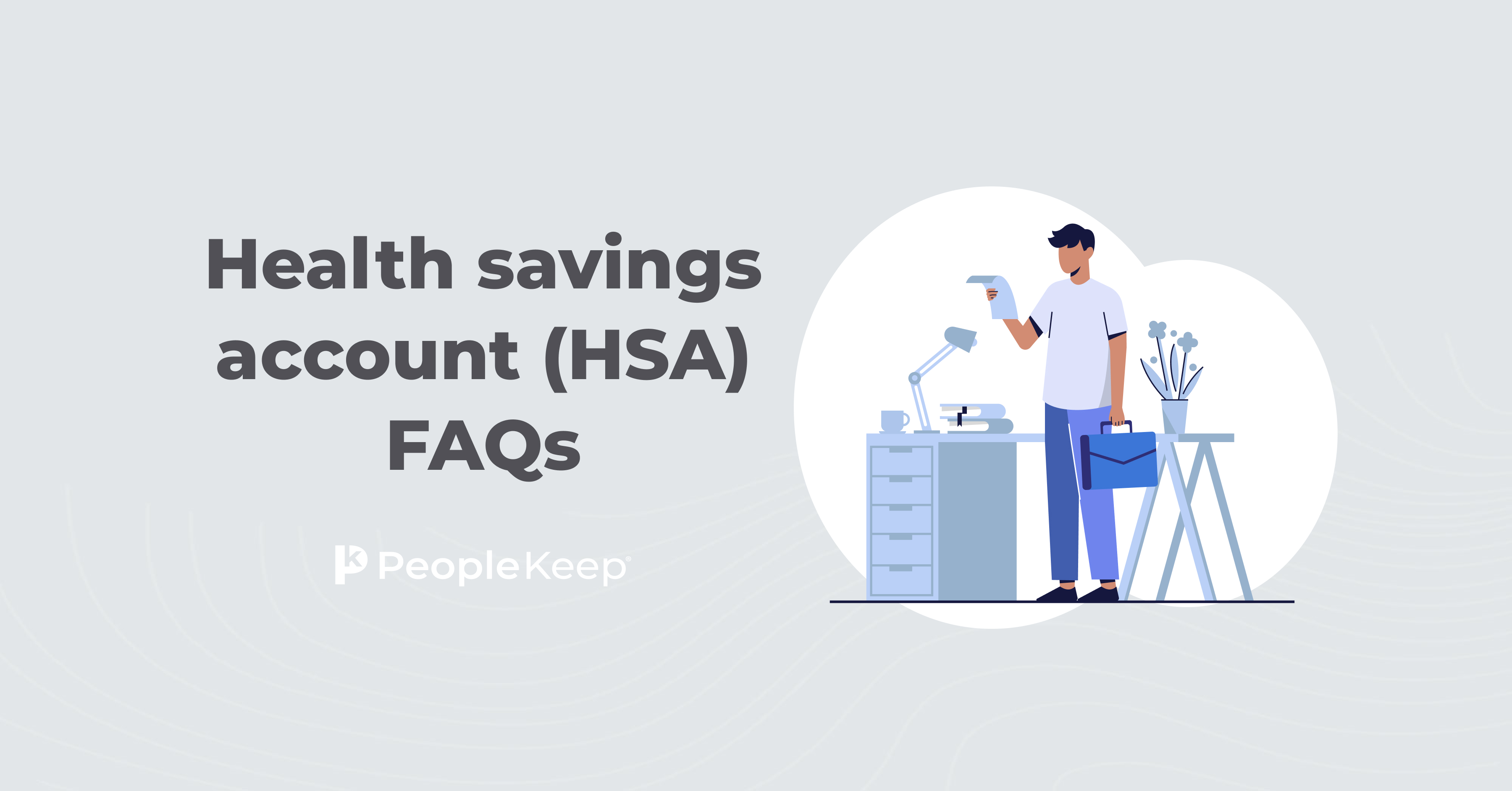Guide to health savings accounts (HSAs)
Learn the basics of offering an HSA at your organization.
Are you looking to enhance or update your organization's health benefits? While an HSA is a great supplemental benefit, a health reimbursement arrangement (HRA) is likely a better fit as a stand-alone health benefit. Talk to someone about which options are the best fit for your team.

- Chapter 1 Introduction
- Chapter 2 What is an HSA?
- Chapter 3 Who is eligible for an HSA?
- Chapter 4 Pros of HSAs
- Chapter 5 Cons of HSAs
- Chapter 6 How employees can maximize their HSAs
- Chapter 7 HSA changes under the One Big Beautiful Bill Act
- Chapter 8 The alternative to an HSA
- Chapter 9 Comparing an HSA to an integrated HRA
- Chapter 10 Offering an HSA alongside an HRA
Flexible health benefits are a top priority for employees
One of the biggest challenges small employers face when it comes to employee benefits is being able to offer a competitive health benefit that can compete with larger employers' bigger budgets.
Offering a flexible benefits package is the best way to ensure that your employees are receiving the benefits that are the most important to them. If you're an employer that wants to add more choice and flexibility to your traditional group plan, an account-based health plan (ABHP) may be exactly what you need.
ABHPs are an excellent way to supplement traditional health insurance plans and offer a flexible, quality health benefit to recruit and retain top talent.
One of the most common ABHPs is a health savings account (HSA). This popular health spending account allows employers and employees to provide a contribution to a savings account. Employees can then use this money to cover some or all of their eligible healthcare expenses on a pre-tax basis.
In the following sections, we'll show you what makes HSAs unique and how they can be the flexible health benefits solution your employees want, as well as compare them to popular alternatives to help you find the best solution for your business.
What is an HSA?
HSAs are special savings accounts where individuals can contribute money on a pre-tax basis to later pay for medical services and other qualifying out-of-pocket expenses. An individual can open an HSA, or an employer can offer it alongside an HSA-qualified high-deductible health plan (HDHP). Regardless of how the HSA is set up, the individual employee always owns it.
Both the employer and the employee can contribute to the HSA so long as the combined employee and employer contributions don't exceed the annual limit on contributions. The Internal Revenue Service (IRS) updates these limits annually in Publication 969.
Both employee and employer contributions remain in the HSA indefinitely until the employee spends the funds. There's no vesting schedule or penalty if the money isn't used, and the money rolls over yearly.
Employees aged 65 and older are free to use their HSA for anything without penalty—not just out-of-pocket medical care costs—so the money you and your employees contribute can be part of their long-term retirement plan. Also, most HSAs issue a debit card or credit card, so participants can easily pay for qualified health expenses with the card.
With HSAs, taxpayers receive a 100% federal income tax deduction on annual contributions. They also may withdraw HSA funds tax-free to pay for qualified medical expenses, and they may defer making such withdrawals indefinitely without tax penalties.
Triple tax advantages
HSAs have tax-deductible contributions, tax-free interest/investment gains, and tax-free withdrawals (for qualified health expenses).
Investments
Employees can invest their health savings for the long term. Investment earnings and growth are 100% tax-free.
No "use it or lose it"
Unspent HSA funds roll over each year, building a nest egg for future retirement, like a 401(k) or IRA.
HSAs are a health benefit designed to support employees' healthcare needs on a long-term basis. The account and its funds belong to the employee, who will retain ownership even if they change health insurance plans or jobs.
Who is eligible for an HSA?
The IRS has strict guidelines for who is eligible to open and contribute to an HSA. If you're considering an HSA at your organization, make sure your benefits coordinator knows the guidelines for eligibility.
An eligible individual qualifies for an HSA if they meet the following requirements:
- They're at least 18 years old.
- They're enrolled in an HSA-eligible health plan, specifically a high-deductible health plan.
- Following the passage of the One Big Beautiful Bill Act in July 2025, all on-exchange bronze and catastrophic individual health insurance plans also count as HSA-qualified plans.
- They're not enrolled in any other non-HSA-eligible health plan.
- This would include any current plan that doesn't meet the requirements for a high-deductible health plan. With the OBBBA, those with direct primary care can still open an HSA.
- They're not eligible to use a flexible spending account (FSA).
- Someone else can’t list them as a dependent on their federal income tax return.
- They're not enrolled in Medicare Parts A & B or Medicaid.
If an employee does not live in the United States, they can still open an HSA under certain circumstances:
- They're a U.S. citizen and are paid in U.S. dollars
- They're employed in the U.S. and paid in U.S. dollars.
Pros of HSAs
Now that you know a little more about HSAs and how they work, let's go over and outline their advantages.
- Tax savings: Contributions an employee makes to their HSA are tax-deductible. Likewise, any contributions made by you as an employer aren't considered taxable income because they're made on a pre-tax basis.
- Rollover contribution: All excess contributions remain in the HSA until they're used. There's no vesting schedule or penalty if the money isn't spent, and excess contributions are automatically rolled over into the next year.
- No tax on qualified withdrawals: Withdrawals used to pay for qualified medical expenses for your employee, their spouse, and their dependents are never taxed. The interest they earn on the account accumulates over the years, tax-deferred. If used to pay for qualified medical expenses, the withdrawal is tax-free.
- Portability: The account is portable, and the employee can keep it forever. The account and the funds within it stay with them even if they quit your company or retire.
- Many expenses qualify: Your employees have access to more than 200 qualified health expenses.
Cons of HSAs
HSAs have inherent advantages that other savings accounts don't offer. But there may be a few downsides to HSAs that could give people pause. Let's take a look at some of those below.
- Contribution limits: With HSAs, there's a set annual maximum amount that limits how much you and your employees can contribute each year.
- High-deductible requirements: Opting for high-deductible health plan coverage can pose a higher financial risk compared to other health insurance plans. Even though employees will pay a lower monthly premium each month, it could be difficult for them to come up with funds to meet the annual deductible.
- Pre-funded accounts: Employers have to pre-fund HSAs, which means you must put up the cash for your employees to use up front, regardless of whether they will spend the money or not.
- Complicated rules: With HSAs, the eligible individual is the plan administrator, not the financial institution. Many individuals find the rules and record-keeping of HSAs complicated and cumbersome.
- Potential penalties: If an employee withdraws funds for non-qualified expenses before they turn 65, they'll owe income taxes on the money plus a 20% penalty.
- Ineligible expenses: HSAs can’t cover health insurance premiums. This means employers can’t offer an HSA as a stand-alone benefit, since employees will still need to purchase their own health insurance and pay those premiums.
How employees can maximize their HSAs
HSAs are invaluable health benefits because they offer immediately accessible money to help your employees pay for medical care costs without them having to tap into their regular checking or savings account.
However, once your employee retires and enrolls in Medicare, their financial institution will no longer allow them to contribute to their HSA. This means they should do everything they can throughout their working years to maximize the value of their HSAs.
Let's look at four ways an employee can boost their HSA balance early on so they can continue to enjoy it once they can no longer contribute to it.
Contribute the maximum amount allowed
Your employees should compare their current annual contributions to the maximum contribution limit to see how much more they can add to their HSA each year. If they're using the account as a retirement savings vehicle and/or anticipate having many out-of-pocket expenses in the future, they should aim to contribute the maximum amount allowed every year.
If they're 55 or older, they can also take advantage of catch-up contributions and add $1,000 per year.
Know what expenses are eligible
Employees can spend their HSA money tax-free on healthcare items and out-of-pocket expenses, such as co-payments for medical care, prescription drugs, or bills not covered by insurance, such as vision care and dental care.
They can even use their HSA for basic over-the-counter items, such as bandages, sunscreen, and cold and allergy medicine. The more you educate your employees on HSA items, the more they'll utilize their funds.
Consolidate multiple HSAs
Some people may have more than one HSA in their lifetime. For example, you might have an employee who already has an HSA from a previous employer and then opened up a new one at your company.
Individuals with multiple HSAs can consolidate them into a single account so they can accelerate overall growth. Also, to make HSAs eligible for investment, they must have a minimum balance, so combining accounts can help participants reach those requirements faster.
Invest a portion of the savings
As stated above, if employees have a minimum balance in their HSA (usually $2,100), they may be eligible to invest a portion of the savings. This can be an excellent way to grow savings tax-free while also being able to pay for certain healthcare expenses both now and in the future.
However, keep in mind that not all HSAs will be eligible for this benefit. Advise your employees to check with their provider to see if they qualify.
HSA changes under the One Big Beautiful Bill Act
OBBBA was signed into law by President Donald Trump on July 4, 2025. This comprehensive legislation encompasses numerous provisions that affect several different industries, such as healthcare. Notably, OBBBA includes key changes aimed at expanding the use of HSAs.
Starting on January 1, 2026:
- On-exchange bronze and catastrophic plans are now HSA-eligible. The federal government will classify bronze and catastrophic individual health plans as high-deductible health plans (HDHPs). This reclassification permits individuals with these types of plans to contribute to an HSA.
- Direct primary care service arrangements won't disqualify someone from contributing to an HSA. Direct primary care service arrangements will no longer be considered disqualifying health plans for HSA eligibility. To be eligible, a DPC should solely offer primary care services. These arrangements come with a fixed periodic fee, with monthly charges capped at $150 for individuals and $300 for families. Should the DPC exceed these limits, it won't qualify. The government adjusts these amounts annually for inflation.
- Direct primary care fees are HSA-eligible. DPC fees will count as an HSA-eligible medical expense.
The alternative to an HSA
If you're not sure if an HSA is right for your organization, you have the option of implementing a health reimbursement arrangement (HRA). Sharing similar features to an HSA, an HRA is an arrangement between an employer and an employee, allowing employees to get reimbursed, tax-free, for their qualified medical expenses.
The HRA that is most similar to an HSA is an integrated HRA. The integrated HRA, or group coverage HRA (GCHRA), is for businesses of all sizes that offer a group health insurance plan.
Only employees who opt into the group health plan can take advantage of the GCHRA. With PeopleKeep, employers can offer unlimited monthly allowances for eligible employees based on seven employee classes to pay for eligible expenses not fully paid for in their group health insurance plan, such as deductibles, coinsurance, and other items.
Integrated HRAs and HSAs are both good ways for employers to supplement a group health insurance plan. But determining which option is right for your organization depends on the type of group health plan you're offering and the level of flexibility and control you want over the benefit.
Get our free e-guide: The complete guide to the group coverage HRA (GCHRA)
Comparing an HSA to an integrated HRA
While both benefits can boost your group health insurance, the lack of contribution requirements, pre-funding, and annual limit makes integrated HRAs much more flexible than an HSA. The comparison chart below covers key differences to consider when deciding between an integrated HRA and an HSA.
|
|
Integrated health reimbursement arrangement (HRA) |
Health savings account (HSA) |
|
What type of plan is it? |
Section 105 reimbursement plan. |
Section 125 cafeteria plan. |
|
How does it work? |
Employers offering a group health insurance plan set an allowance to help employees pay for out-of-pocket expenses. The employer pays when employees submit expenses for reimbursement. Funds are capped at the annual allowance amount, and all reimbursements are tax-free. |
Employees, or employers on their behalf, covered by an HSA-qualified high-deductible health plan, open an employee-owned account for qualified medical expenses. Employees and employers contribute pre-tax dollars to the account up to the IRS-defined annual contribution limit. |
|
Who may participate? |
Any employees covered by the employer’s ACA-approved group health insurance plan. |
Employees with high-deductible health coverage with no other major medical coverage. |
|
Who may contribute? |
Only the employer. |
Both the employer and employee. |
|
Are there annual contribution limits? |
No. Employers may offer as much or as little as they wish. |
Yes. In 2025, contribution limits were $4,300 for individuals and $8,550 for families. In 2026, this increases to $4,400 for individuals and $8,750 for families. Catch-up contributions are $1,000 for both eligible individuals and families. |
|
What are the customization options? |
Employee classes: Employers can group employees into classes on job-based criteria to determine benefit eligibility and customize allowance amounts. PeopleKeep supports seven distinct GCHRA classes. Eligible expenses: Employers can allow all expenses listed in IRC 213(d) or only expenses that require an explanation of benefits (EOB). Deductible: Employers can require employees to pay a set dollar amount before being eligible for reimbursement. Cost-sharing: Employers can require employees to pay a percentage of eligible expenses submitted for reimbursement. |
None. |
|
Does it require a separate bank account? |
No. |
Yes. |
|
Which expenses are eligible? |
All expenses listed in IRS Publication 502— however, the EOB can outline the limits. |
All expenses listed in IRS Publication 502. |
|
How are they taxed? |
Reimbursements are tax-free for the employer and employee. |
Deposits are made pre-tax and withdrawals are tax-free, so long as they’re being withdrawn for qualifying medical expenses. |
|
Can employees use funds for non-medical expenses? |
No. |
Yes, but employees younger than 65 will pay income taxes plus an additional 20% tax penalty. Employees 65+ aren’t subject to a penalty but still pay income taxes. |
|
Do unused funds roll over from year to year? |
No. |
Yes. |
|
How does employee utilization affect employer costs? |
Cost is based on employee utilization up to the total annual allowance amount. Any unused allowance at the end of the year stays with the employer. |
100% of employer contributions stay in the employee’s account regardless of utilization. |
|
Is the fund or account portable? What happens to the remaining funds when an employee leaves the company? |
No. Any unused allowance stays with the employer when the employee leaves. However, employees may have up to 90 days after departure to submit incurred expenses for reimbursement while they were still employed. |
Yes. All account funds stay with the employee, including employer contributions, stay with the employee when they leave. |
Offering an HSA alongside an HRA
If you're interested in both HSAs and HRAs and can't decide which is best for your organization, you're in luck! As an employer, you can offer both benefits at the same time. This approach often provides the best value to employees. However, there are some requirements you need to meet to remain compliant.
Instead of offering a GCHRA, you can offer a qualified small employer HRA (QSEHRA) or individual coverage HRA (ICHRA). These stand-alone HRAs allow you to reimburse your employees for their individual health insurance premiums. With a stand-alone HRA, you can break free from traditional group health insurance altogether.
The simplest way for an employer to offer a stand-alone HRA and an HSA together is to offer a "limited-purpose HRA” that only reimburses employees for expenses that are exempt from the HSA deductible requirement.
These expenses include:
- Your health insurance premium
- Your long-term care insurance premium
- Dental expenses
- Vision care expenses
A standard HRA will make an employee ineligible for an HSA because it would provide coverage for all qualified medical expenses, including copays for prescriptions, which aren't exempt.
If you plan to offer an HRA through a provider, you must make sure they allow you to limit expenses to just these categories so that you can comply with IRS rules. With PeopleKeep by Remodel Health, you can easily offer an HSA-compliant QSEHRA or ICHRA.
Learn more about the HRAs you can offer with PeopleKeep
Qualified small employer HRA (QSEHRA)
A powerful first-time benefit or alternative to group health insurance made specifically for small employers.
Individual coverage HRA (ICHRA)
A health benefit that enables employers to cover the individual insurance plans their employees choose.
Group coverage HRA (GCHRA)
A health benefit that employers can use to help employees with their out-of-pocket expenses. It pairs with a group plan.
Frequency asked questions
An HRA is an arrangement between an employer and an employee, allowing them to get reimbursed for their qualified medical expenses. An HSA is a portable account that the employee owns and keeps with them even after they leave the organization. With an HRA, the employee only gets paid when they incur an eligible expense, while an HSA is pre-funded each month regardless of whether or not they spend the money.
HRAs, HSAs, and FSAs are all reimbursement model health insurance plans. However, each type has different benefits and requirements for employers and employees.
Learn more about their differences with our comparison chart.To open an HSA for your organization, you also need to offer a high-deductible health plan. The IRS defines what is considered an HDHP. In 2025, your plan's annual deductible must be at least $1,650 for individual coverage or $3,300 for family coverage.
For employees to be eligible for an HSA:
- They must have coverage under an HDHP.
- They must have no other health coverage except what IRS Publication 969 outlines.
- They must not have Medicare.
Employees can make pre-tax contributions (or tax-deductible contributions, if not through just their employer contributions) in 2025 of up to $4,300/year if they have individual coverage or up to $8,550/year for family coverage. In 2026, this increases to $4,400 and $8,750.
People age 55 and older can contribute an extra $1,000 per year. Your employees can add money to the account for the previous year's contribution limit until the tax-filing deadline.
Your employees can spend their tax-free dollars on qualified medical expenses, such as their deductible, co-payments for medical care and prescription drugs, or bills not covered by insurance, such as qualified vision care and dental care. They can use our eligible expense tool to learn more or ask their tax advisor.
Unlike with an FSA, employees don't have to use HSA funds by the end of the year. Instead, HSA funds can grow tax-deferred in their HSA account for later use.
If they use HSA funds for non-medical expenses, they must pay taxes on the withdrawal, plus a 20% penalty before age 65.
Many HSA administrators or banks will let your employees shift money into mutual funds and other investments after their HSA account balance reaches a certain level.
Employees can keep and use their HSA account at any age, but they can no longer make new contributions to the account after they have signed up for Medicare Part A or Medicare Part B, which usually happens at age 65.
No. With an HSA, there are no income limits.
Employees can keep the money in their HSA account after they leave a job, similar to a 401(k). There's no requirement to spend it before they terminate employment.
Contributors:

Holly Bengfort
Content Marketing Specialist
Related resources

Should I offer an HRA or HSA?

HRA vs. HSA vs. FSA comparison chart



